- Home
- P. G. Wodehouse
SIX SHORT STORIES Page 2
SIX SHORT STORIES Read online
Page 2
Among the friends he made at College — for even a man of his hideous moral blackness makes friends — was one James Prendergast. To sum up James's salient points, he was six-foot-two in height, frivolous in disposition, and boasted a skill amounting to genius in the art of tossing for drinks. He had a theory that a man who wishes to leave the world a better place for his presence in it should choose a walk in life, and not rest until he has made himself pre-eminent in it. James's walk in life was tossing for drinks.
It did not escape the notice of his acquaintances that Rupert Alexander Bashmead was at considerable pains to cultivate James Prendergast. To account for this phenomenon, they were divided into two schools of thought. His enemies said, in their malicious way, that they supposed he must like James. His friends generously ridiculed the idea. It was absurd, they argued, to suppose that he would make a friend of a man unless he hoped to get something out of him. He was trying to borrow money from James — that was it.
But they were wrong, and for this reason — James had no money. If he had any, we have every reason to suppose that Rupert would have endeavoured to borrow it but as he had none another explanation becomes necessary. Nor is it far to seek. James had a sister, Muriel. There was not much of her, but what there was was charming. Brown hair and grey eyes. Some people said she was clever. Her friends said it was a pity, but she was not nearly so clever as she imagined herself to be.
It was shortly after his introduction to her that Rupert discovered, with no small astonishment, that there was someone in the world whom he cared for more than himself. Matters speedily reached such a pitch that, after carefully diagnosing his symptoms, he came to the conclusion that he was madly in love. At the time at which this story opens he had reached the last stage, where the patient habitually steals small articles, such as gloves and handkerchiefs, from the Object; treasures them simply because she has touched them, and resolves to lead a better life.
It was, therefore, with immense disgust that he found that he had a rival, a person of such innate nobility of character that, though his name was George Jobson, he was not ashamed of it. Also he wore a made-up tie, and was not ashamed of that either. Moral worth could go no further.
Muriel seemed to like his surety. Nay, to judge by appearances, she preferred it to that of Rupert Alexander Bashmead. Jobson's strong suit was literature. Under the pseudonym of "Theodore Dalrymple" he had once had a short poem published in a magazine. It was not so much the fact that he had received two-and-eightpence for this effort that appealed to Muriel. For the sordid gains of the pen she had little sympathy. It was the fame that won her respect. She, too, trod the thorny paths of Literature. One of her stories, "The Love of Gabriel Undershaw" had been refused by some of the best periodicals in London. This did not make her arrogant, but it gave her a certain feeling of superiority over those of more merely mortal clay, and on the strength of it she had called Rupert Alexander Bashmead — much to the delight of Jobson, who had been present at the outrage — vapid and irreflective, and had scouted the notion that he possessed a soul. And what was left of Rupert had retired in bad order to his lonely rooms. While he was sitting there, chewing a pipe and revolving thoughts of breaking into feverish verse on his own account, James appeared.
"You seem mouldy," was James's didactic utterance. "I've got something here that'll cheer you up."
"Bet it won't," said Rupert, with gloom.
"I bet it does. It nearly killed me. I thought I should have broken something internally. It's a story of my sister's. I found it in the drawing-room. Are you ready?"
Rupert had never been privileged to hear anything from Muriel's pen before.
"I didn't know your sister wrote comic things," he said.
"Nor does she mean to," replied James briefly. "Now then."
And, having announced the title, "Stolen Lips," he embarked upon the story.
For the first two paragraphs the gloom of his listener's countenance remained unshaken. At the fourth his features relaxed. At the seventh he gulped. And, by the time the middle of the tale was reached, he was on the floor biting the carpet.
"More, more!" moaned the stricken Rupert as his friend finished. "Read it again."
He read it again.
And this is where the peculiar baseness of Rupert Alexander Bashmead begins to rear its serpent head. I find the ink on my pen growing white with horror as I write of that scoundrel's immoral doings. Briefly, his shameful conduct was this. He egged on his accomplice, the man Prendergast, to read "Stolen Lips" to him until its first freshness, and, so to speak, its suddenness, had worn off, and he could hear it administered to him without any violent upheaval. Then he put into effect the inconceivably scandalous plot which his disgraceful mind had formed. He called upon Miss Muriel Prendergast at a time when he knew that George Jobson would be there, and, by preconcerted arrangement, James, his misguided tool, entered the room.
"Oh, I say," remarked James, extending a bundle of manuscript, "I've found that story you lost, Muriel."
"Oh, I am glad!" said Muriel, clutching the recovered treasure.
"I wish," observed the snake, Bashmead, "that you would read it to us."
"Oh, please do!" cooed the unsuspecting Jobson.
"If you would really like it," said Muriel.
"Oh, we should," murmured Jobson.
"It is called," said Muriel, "'Stolen Lips.'"
James darted from the room, and she began to read.
"If," said the unspeakable Bashmead, severely, three minutes later, "you cannot behave like a gentleman, Mr. Jobson, wouldn't it be as well if you went?"
"Good-bye, Mr. Jobson," said Muriel. Her manner would have been noticeably chilly in a refrigerator. Jobson left.
"A man," said Bashmead, judicially, "who could find anything to laugh at in a beautiful story like 'Stolen Lips' is capable of anything."
"Yes, isn't he?" said Muriel.
"He is outside the pale; unworthy to associate with his fellow-man. A fit companion for the brutes that perish. In fine, a worm!"
"Yes, isn't he?" said Muriel.
It is a painful story. I have only to add that a wedding was arranged and shortly took place between Rupert Alexander Bashmead and Muriel, only daughter of the late Francis Prendergast; that the bride, who was given away by her uncle, Sir Theophilus Prendergast, looked charming in mousseline de soie, with heliotrope aiguillettes; and that the presents were both numerous and costly. As for George Jobson, shortly before the wedding he joined an exploring expedition to darkest Clapham, and, as he never came back, it is only too probable that he fell a victim to the bores and other beasts which infest that desolate region. Somewhere out in that trackless desert, the great Common, from which so few travellers return, lies a rapidly bleaching skeleton. In happier days that skeleton was Jobson.
ALL ABOUT THE PASTIME OF DIVORCE
BY PELHAM GRENVILLE
Divorce, which is derived from the Latin word divertere, to go apart, and may be either an occasional experiment, as in the case of the ordinary citizen, or a hobby, as with Mr. Nat Goodwin, Mr. Robert Fitzsimmons, and Mr. De Wolf Hopper, is best described as the privilege accorded to the losing player (in the game of matrimony) to buy another stack of chips and start in all over again. It is an ingenious invention by which the resolute man may enjoy all the advantages of being a Mormon elder, without having plays written about him by Harriet Ford and Harvey O'Higgins. The word divorce is in many ways the most popular in the language, and it is by virtue of constantly repeating it to himself, like a magic charm, that the fastidious man is enabled to bear up, when first confronted by his wife's relations.
Divorce, in its earliest stages, was a crude thing. Prehistoric Man conducted his divorces, as he did his marriages, with the fat end of a stone bludgeon. The only way in which the divorce ceremony differed from the marriage ceremony was that in the former case the plaintiff hit harder.
The idea of the remarriage of a divorcee was repugnant to him, and he endeavore
d to render such a thing out of the question.
It was under the Ancient Romans that Divorce, considered as a fine art, reached its highest point. The astute husbands and wives of that epoch saw their way to doing themselves a bit of good by means of it. There is no doubt that the Romans gave divorce-presents, probably in the shape of fish-slices, egg-holders, plate-warmers and all those things which, when taken round the corner to the local pawnbroker (/avusicidus/), could be exchanged for solid and satisfactory cash (/denarii/). The Ancient Roman, therefore, got his unfortunate friends as it were, coming and going, and may be said to have known a bit.
In modern times Divorce varies greatly according to the country in which it takes place. In England for instance, it is so rare that, when it happens, the newspapers devote most of their middle page to a report of the proceedings. But as a matter of fact, divorce in England is mostly confined to the theatre. If the first act of an English play is laid either in the morning-room of Maltravers Park or in the drawing-room of Lady Beevor's town-house in Grosvenor Square, you can he pretty sure that somebody's divorce is going to be the motive of it.
It is assumed — in England, at any rate — that the United States leads the world in the matter of divorce: and it will probably be a severe blow to our patriots to learn that this is not the case. Even at the risk of inflaming Messrs. Goodwin, Fitzsimmons, and Hopper to renewed efforts, we must state the truth — that Japan makes America look like a timid novice in this particular branch of industry. In Japan there are twenty-two divorces per thousand inhabitants, while in the United States there are a mere eight per thousand. It is but a melancholy consolation that the next competitor in order, Switzerland, only scores three.
This is the sort of revelation which takes all the heart out of an energetic and persevering people. The reason is not far to seek. It lies in the fact that, while certain States are doing all that can be expected of them — we take off our hat to Washington, where there are eleven separate and distinct grounds for divorce — others are simply loafing. In South Carolina, for instance, divorce is actually not permitted, and in many states it cannot he obtained for such perfectly adequate causes as teasing the Siberian eel-spaniel, omitting to bring home candy, putting ice in the claret, wearing a straw-hat before June the fifteenth, reading the novels of Harold Bell Wright, using a last season's automobile, revoking at Bridge, and appearing in public in tortoise-shell-rimmed spectacles. Naturally the Japanese, a race which pulls together as one man in every patriotic movement, is way ahead of the United States.
But, even under existing conditions, with every obstacle placed in the way of divorce, it is astonishing that it is not more common. When we look about us and see how uniformly repulsive our fellow human-beings are, it seems extraordinary that only eight out of every thousand of them take the sensible course of breaking away from one another forever. The reason is that, in this country, the expense of divorce is so great. The male aspirant is faced with the prospect of having to part not only from his wife, which he could endure cheerfully, but from a considerable portion of his hard-earned doubloons in the shape of alimony. Judges, as a class, display, in the matter of arranging alimony, that reckless generosity which is only found in men who are giving away somebody else's money. It is getting so that divorce, instead of being the pastime of the people, has degenerated into a relaxation for the idle rich.
Alimony in Japan is a mere matter of yen — a yen being about a thousandth part of a dollar. With a reasonable amount of luck, your Japanese can get divorced half a dozen times a year for about what it would cost him in New York to tip the head-waiter of a second-rate cabaret for getting him a table twenty-seven feet from the dancing-floor and directly behind a pillar.
AUBREY'S ARRESTED INDIVIDUALITY
BY P. BROOKE HAVEN
What soured existence for Aubrey Devine was the fact that his wife was, in one important matter, unreasonable. She declined to go before the world as the bearer of his name. Her argument was two-fold. In the first place she claimed that, as Adelaide Brewster Moggs, she was already carrying a sufficient weight of name for one weak woman and that, in a world which contained Virginia Terhune van der Water, Mary Raymond Shipman Andrews, and Beatrice Forbes-Robertson Hale, there was not sufficient space for Adelaide Brewster Moggs Devine. In the second place, Adelaide Brewster Moggs was not so much a name as a trade-mark. The public had grown accustomed to welcoming the utterances on The Future of Woman by Adelaide Brewster Moggs, and to spring an unexpected Devine on them would perplex and annoy them. It would be as if they were suddenly confronted at their favorite vaudeville house with Eva Tanguay Robinson or Irene Franklin Chesterfield-Bodsworth.
Aubrey yielded the point, and with it his individuality. It is true that one or two intimate friends down-town knew him as Devine, but to the world at large he was "I-forget-his-name, Adelaide Brewster Moggs' husband." Earnest sociologists who tripped over Aubrey in dark corners of the Devine apartment on the occasion of Adelaide Brewster Moggs' weekly salons, in relating the episode to their wives, would not say that they had stubbed their toe on Aubrey Rockmetteller Devine, they would say that they fell foul of Miss Moggs' husband. Newspaper reports of meetings graced by the presence of America's leading exponent of Woman's Rights would record a speech from Miss Adelaide Brewster Moggs, "who was accompanied by her husband." Sometimes a snapshot of Adelaide would appear in a Sunday paper, with Aubrey at her side. The legend beneath it would run "Miss Adelaide Brewster Moggs, the famous champion of Womanhood, with her husband."
This preyed upon Aubrey's mind. It gave him a feeling of disembodied spirituality which was most unpleasant. Sometimes he had to pinch himself to make sure that he was there. When signing a check he would often pause an instant to remember what name he ought to write.
He began to brood. Lying awake at night, he would try to think up ways of making a name for himself. He went at it systematically. He made a list of the most prominent men in the country, men who had made names for themselves, as follows:
President Wilson, William J. Bryan, Jack Johnson, Vernon Castle, Billy Sunday, George M. Cohan, John D. Rockefeller.
Could he follow in these men's footsteps? No, and, briefly, for the following reasons:
He did not know how to wait watchfully. He disliked grape-juice. He could not box. He tripped over his feet when he tried to foxtrot. He did not perspire readily. He had no father. He had a good digestion.
Sometimes he thought of committing a murder or robbing a bank, but refrained because the sight of blood always made him feel faint and there seemed, for a novice, to be so few opportunities of robbing banks.
But one morning Fate relented. Genevieve O'Grady entered his life.
One really scarcely knows what to say of Miss O'Grady. She was employed by the Mammoth Store, and, except on very rare occasions, hardly ever had to work more than eleven hours a day. And she was in receipt of the excellent salary of five and half dollars a week, ample for a young girl who does not keep an automobile and has mastered the art of living on bread and weak tea. Looking at it with the eye of a dispassionate observer, one would have said that life was one long round of enjoyment for the girl. She had the whole day to herself except from eight in the morning till seven at night, and nothing to do with her money, after feeding and clothing herself, except squander it on her personal pleasure.
Yet this child of fortune, in a silly mood, flung herself off the side of a ferry-boat into the whirling waters of the Hudson River. Of the dozen or so spectators of the incident, all had some remark to make about it. One said, "What did she do that for?" Another said, "Would you look at that!" Others declared that somebody ought to do something about it.
The only person present to take definite action was Aubrey Rockmetteller Devine.
To Aubrey this chance seemed sent by Heaven. Pausing merely to remove his hat he plunged in and swam to where Miss O'Grady, now repenting of her rash act, kicked and called for help. The only doubt in his mind was the exact way in wh
ich the papers would feature the thing.
They might say:
DEVINE'S DASHING DEED DARINGLY DRAGS DAMSEL FROM DIRE DESTRUCTION
Or possibly,
DEVINE DID IT Saw, Seized, Saved Suicidal Shop Girl
Or again,
DARE-DEVIL DEVINE DIVERTS DEATH BY DROWNING
As he reached her, Miss O'Grady came up for the third time and twined herself clingingly about him. They returned below the surface together.
Just about the time when the only really suitable headline for the incident would have been
DEVINE SWALLOWS ALL OF THE HUDSON RIVER
help arrived.
After they had done all that first-aid-for-the-apparently-drowned stuff on Aubrey, they took him and the dripping lady to Park Row. There the reporters all had a good look at him.
"Why, I know that man," one of the news editors finally exclaimed. "It's — it's — I've forgotten his name, but he's Adelaide Brewster Moggs' husband."
THE DISAPPEARANCE OF PODMARSH
GOOD NEWS FOR AFTER-DINNER SPEAKERS
Stuyvesant Bodger, the explorer, is back from West Africa with a strange story, — several strange stories, in fact, but one which differs from the others in that we cannot be absolutely certain that it is a lie. He claims to have seen and spoken to Robert Podmarsh.
Only the oldest members now remember Podmarsh, once the scourge of the club. It is so many years since he disappeared. He vanished one summer without warning, and I can still recall the period of anxiety we lived through. We were afraid he might be in our midst at any moment, telling us those old familiar humorous stories of his under which we had suffered so long. Then, as the days went by and he still remained absent, a new hope began to animate our breasts. And finally we came to the conclusion that he must be dead.

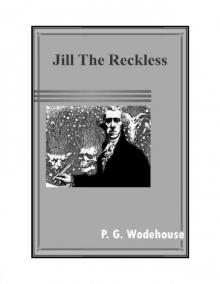 Jill the Reckless
Jill the Reckless Uncle Fred in the Springtime
Uncle Fred in the Springtime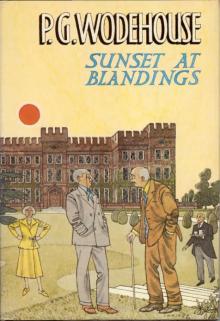 Sunset at Blandings
Sunset at Blandings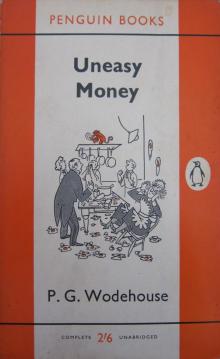 Uneasy Money
Uneasy Money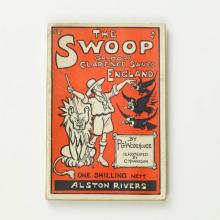 The Swoop! or, How Clarence Saved England: A Tale of the Great Invasion
The Swoop! or, How Clarence Saved England: A Tale of the Great Invasion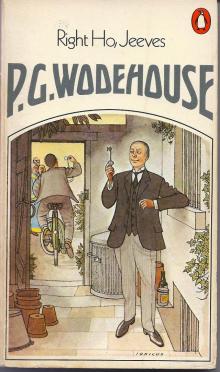 Right Ho, Jeeves
Right Ho, Jeeves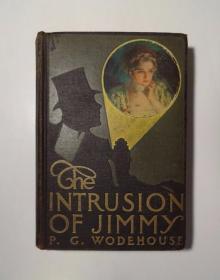 The Intrusion of Jimmy
The Intrusion of Jimmy The Jeeves Omnibus - Vol 1:
The Jeeves Omnibus - Vol 1: Aunts Aren't Gentlemen:
Aunts Aren't Gentlemen: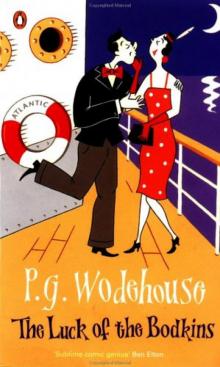 The Luck of the Bodkins
The Luck of the Bodkins The Little Nugget
The Little Nugget Money for Nothing
Money for Nothing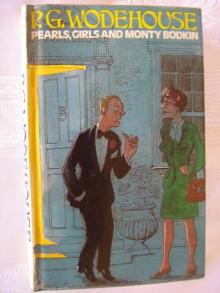 Pearls, Girls and Monty Bodkin
Pearls, Girls and Monty Bodkin Mulliner Nights
Mulliner Nights Blandings Castle and Elsewhere
Blandings Castle and Elsewhere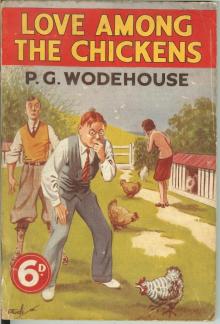 Love Among the Chickens
Love Among the Chickens Carry On, Jeeves!
Carry On, Jeeves!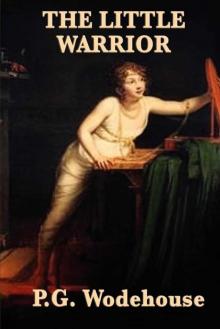 The Little Warrior
The Little Warrior Ice in the Bedroom
Ice in the Bedroom Leave It to Psmith
Leave It to Psmith Thank You, Jeeves:
Thank You, Jeeves: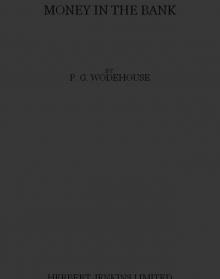 Money in the Bank
Money in the Bank The Man Upstairs and Other Stories
The Man Upstairs and Other Stories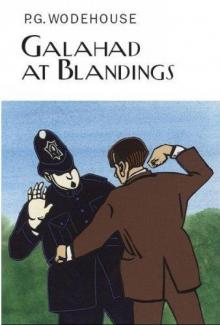 Galahad at Blandings
Galahad at Blandings The Jeeves Omnibus Vol. 5
The Jeeves Omnibus Vol. 5 Uncle Dynamite
Uncle Dynamite Mike at Wrykyn
Mike at Wrykyn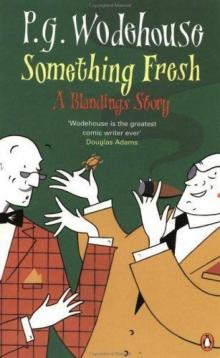 Something Fresh
Something Fresh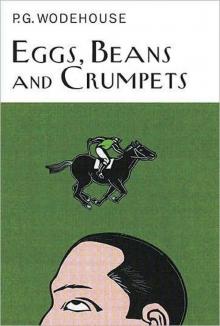 Eggs, Beans and Crumpets
Eggs, Beans and Crumpets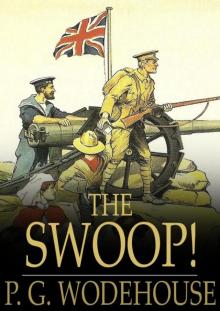 The Swoop: How Clarence Saved England (Forgotten Books)
The Swoop: How Clarence Saved England (Forgotten Books)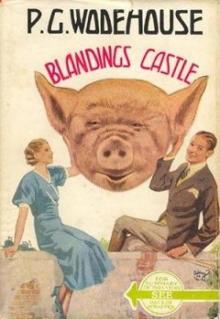 Blanding Castle Omnibus
Blanding Castle Omnibus Wodehouse at the Wicket: A Cricketing Anthology
Wodehouse at the Wicket: A Cricketing Anthology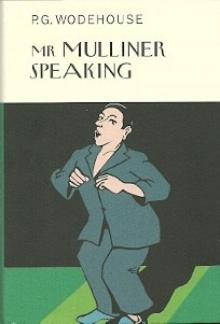 Mr. Mulliner Speaking
Mr. Mulliner Speaking Hot Water
Hot Water The Jeeves Omnibus - Vol 3: The Mating Season / Ring for Jeeves / Very Good, Jeeves
The Jeeves Omnibus - Vol 3: The Mating Season / Ring for Jeeves / Very Good, Jeeves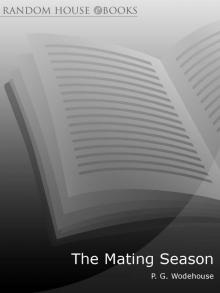 The Mating Season
The Mating Season Meet Mr. Mulliner
Meet Mr. Mulliner The Man with Two Left Feet, and Other Stories
The Man with Two Left Feet, and Other Stories Not George Washington — an Autobiographical Novel
Not George Washington — an Autobiographical Novel Young Men in Spats
Young Men in Spats The Jeeves Omnibus Vol. 4
The Jeeves Omnibus Vol. 4 A Pelican at Blandings:
A Pelican at Blandings: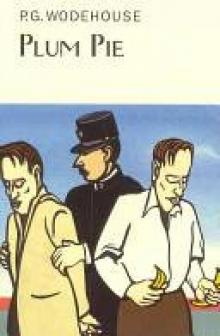 Plum Pie
Plum Pie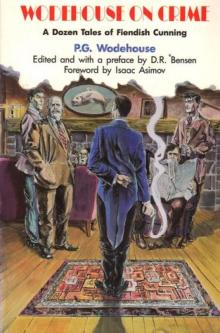 Wodehouse On Crime
Wodehouse On Crime The Jeeves Omnibus Vol. 2: Right Ho, Jeeves / Joy in the Morning / Carry On, Jeeves
The Jeeves Omnibus Vol. 2: Right Ho, Jeeves / Joy in the Morning / Carry On, Jeeves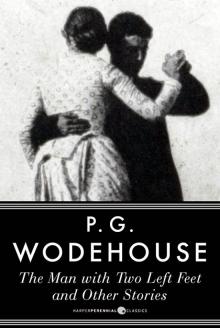 The Man With Two Left Feet
The Man With Two Left Feet Full Moon:
Full Moon: Jeeves and the Feudal Spirit:
Jeeves and the Feudal Spirit: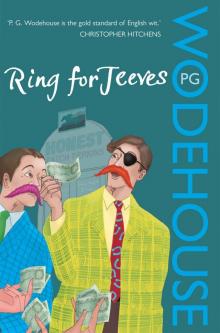 Ring For Jeeves
Ring For Jeeves Something New
Something New The Girl on the Boat
The Girl on the Boat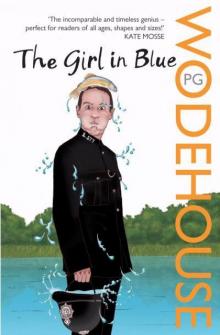 The Girl in Blue
The Girl in Blue Pigs Have Wings:
Pigs Have Wings: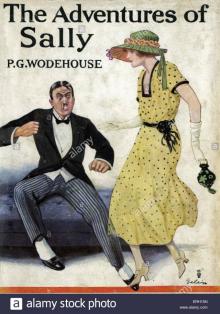 The Adventures of Sally
The Adventures of Sally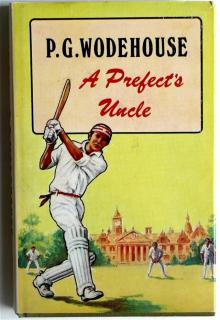 A Prefect's Uncle
A Prefect's Uncle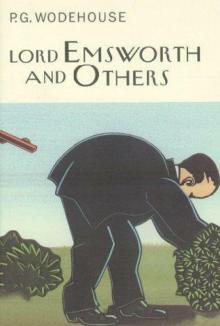 Lord Emsworth and Others
Lord Emsworth and Others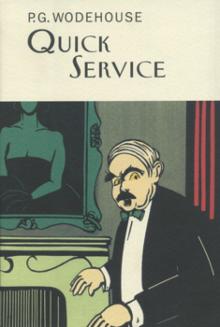 Quick Service
Quick Service The Prince and Betty
The Prince and Betty The Gem Collector
The Gem Collector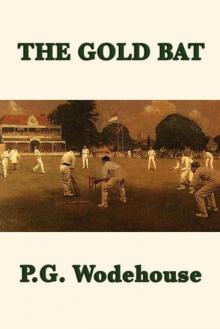 The Gold Bat
The Gold Bat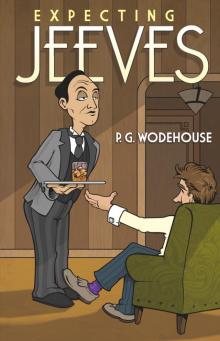 Expecting Jeeves
Expecting Jeeves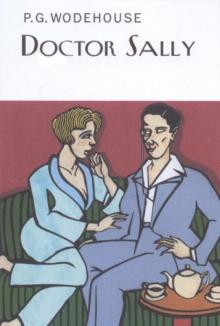 Doctor Sally
Doctor Sally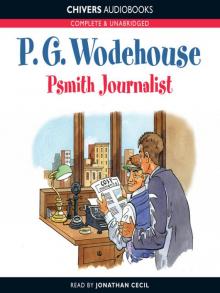 Psmith, Journalist
Psmith, Journalist The Golf Omnibus
The Golf Omnibus Heavy Weather
Heavy Weather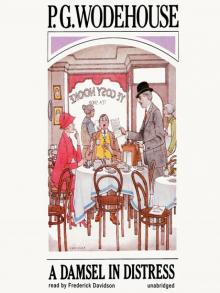 A Damsel in Distress
A Damsel in Distress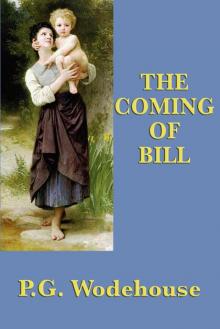 The Coming of Bill
The Coming of Bill Summer Lightning
Summer Lightning Piccadilly Jim
Piccadilly Jim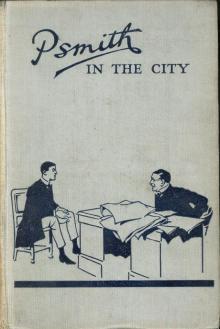 Psmith in the City
Psmith in the City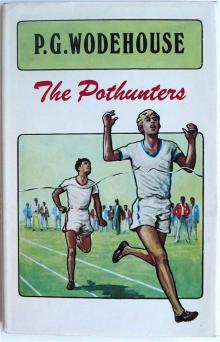 The Pothunters
The Pothunters Service With a Smile
Service With a Smile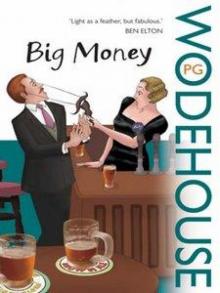 Big Money
Big Money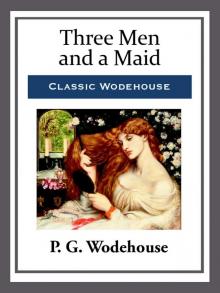 Three Men and a Maid
Three Men and a Maid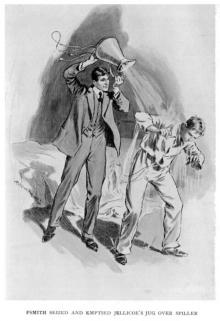 Mike and Psmith
Mike and Psmith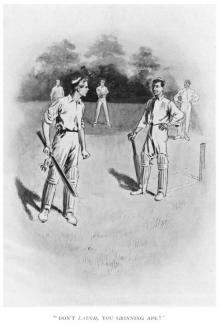 Mike
Mike Tales of St. Austin's
Tales of St. Austin's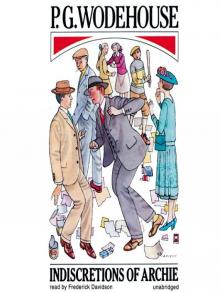 Indiscretions of Archie
Indiscretions of Archie Pigs Have Wings
Pigs Have Wings The Jeeves Omnibus - Vol 4: (Jeeves & Wooster): No.4
The Jeeves Omnibus - Vol 4: (Jeeves & Wooster): No.4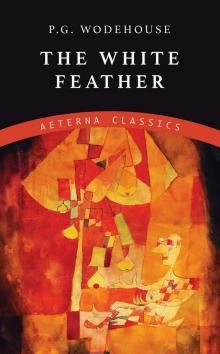 The White Feather
The White Feather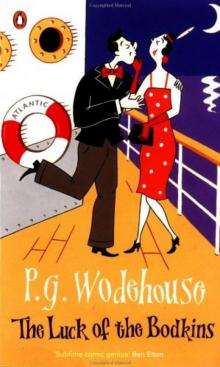 Luck of the Bodkins
Luck of the Bodkins THE SPRING SUIT
THE SPRING SUIT Full Moon
Full Moon Very Good, Jeeves
Very Good, Jeeves Thank You, Jeeves
Thank You, Jeeves Reginald's Record Knock.
Reginald's Record Knock. Wodehouse At the Wicket
Wodehouse At the Wicket LADIES AND GENTLEMEN V. PLAYERS
LADIES AND GENTLEMEN V. PLAYERS The Jeeves Omnibus - Vol 5: (Jeeves & Wooster)
The Jeeves Omnibus - Vol 5: (Jeeves & Wooster) The Jeeves Omnibus - Vol 1: (Jeeves & Wooster): No.1
The Jeeves Omnibus - Vol 1: (Jeeves & Wooster): No.1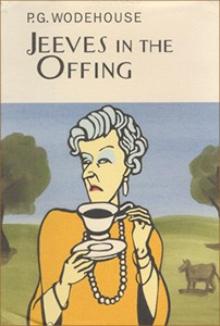 Jeeves in the offing jaw-12
Jeeves in the offing jaw-12